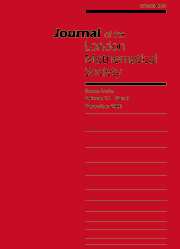Article contents
CASTELNUOVO–MUMFORD REGULARITY AND ANALYTIC DEVIATION OF IDEALS
Published online by Cambridge University Press: 30 October 2000
Abstract
Let (A, [mfr ]) be a local ring. For convenience we will assume throughout this paper that the residue field of A is infinite.
Let I be an ideal of A. An ideal J ⊆I is called a reduction of I if JIn = In+1 for some integer n. The least number n with this property is denoted by rJ (I). A reduction of I is said to be minimal if it does not contain any other reduction of I. The reduction number r(I) of I is the minimum of rJ(I) for all minimal reductions J of I. A minimal reduction of I usually has better properties than I. It can be viewed as an approximation of I and the reduction number is a measure for how it is different from I. The minimal number of generators of every minimal reduction of I is equal to the dimension of the fibre ring [oplus ]n[ges ]0In/[mfr ]In. This invariant is called the analytic spread of I and denoted by [lscr ](I). All these notions have played an important role in ideal theory since their introduction by Northcott and Rees [16].
- Type
- Research Article
- Information
- Copyright
- The London Mathematical Society 2000
- 1
- Cited by


